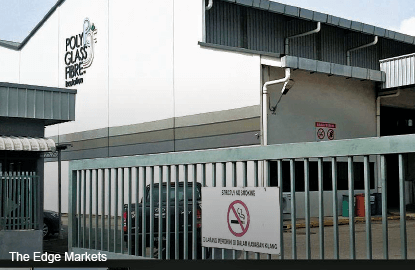
This article first appeared in The Edge Financial Daily, on September 25, 2015.
GEORGE TOWN: Poly Glass Fibre (M) Bhd, a Penang-based fibre glass wool maker, expects higher revenue from its Australia and New Zealand markets to help offset a potential drop in domestic sales as construction projects slow down.
Its executive chairman and chief executive officer Fong Wern Sheng said the group is anticipating sales in the Malaysian market to slump 10% to 20% for the current financial year ending Feb 29, 2016 (FY16), dragged down by fewer jobs at local construction companies. The local market currently generates 40% of Poly Glass’ revenue.
To mitigate the sales drop, the group aims to double its market share in Australia and New Zealand by FY17. Poly Glass currently holds less than 3% market share in the two markets, despite the greater demand for glass wool insulation products there than Asian markets.
‘The demand for glass wool insulation products is bigger in the Oceania, Australia and New Zealand markets than in Asia. As such, we aim to double our share in these markets from less than 3% now to 20% between three and five years,” Fong told The Edge Financial Daily in an interview.
He said the challenges from stiff market competition and volatile currency rates in Malaysia and Asia can also be reduced through economies of scale in Australia and New Zealand.
For FY15, Poly Glass posted a 6.9% decline in net profit to RM5.51 million from RM5.91 million a year ago, while revenue increased 8.2% to RM43.92 million from RM40.6 million in FY14.
Of the total revenue, RM8.34 million or 19% came from the Oceania market, while Malaysia made up RM19.5 million or 44%. The Asian market including Indonesia contributed another RM15.3 million or 34.9%.
Fong said to cope with the anticipated increase in demand, Poly Glass invested RM23 million in new machines to boost production, as well as expanded its warehousing space.
‘We aim to increase automation and produce more in a short time. Thus, we are also spending RM1.5 million to upgrade the machines for the downstream sector,” he said.
Fong said Poly Glass’ plants are running at 60% capacity, producing about 20,000 tonnes of glass wool insulation products every year.
‘The total market for glass wool insulation products in Australia and New Zealand is estimated to be about 80,000 tonnes per year. We aim to eventually supply 16,000 tonnes per year to the two countries, which would represent about 20% share of the market there,” he said.
The group has also embarked on a campaign aimed at educating the public on the use of good quality insulation products for safety reasons in its marketing strategy to increase sales.
He said consumers were inclined to pick cheaper products that come from China than local ones which have better quality but priced higher.
“We are also working with the building sector to incorporate the energy efficient code for industrial buidings as stated in the Uniform Building By-Laws which were gazetted at the federal level. It has not been gazetted at the state level.
“It would mean that builders must abide by the minimum energy-saving ratings. This could be for roofing where insulation is required for buildings of a certain size,” he said.
On its property development segment, Fong said it is exploring the idea of developing an eco-tourism hotel in Tanjung Malim, Perak, where it owns a 407.5ha plot of former plantation land.
“It would be a new revenue stream (for the group) in the next few years. The area is suitable for a boutique hotel. We are still studying the eco concept,” he said.
Poly Glass (fundamental: 1.25; valuation: 1.1) shares were untraded last Friday. The illiquid stock last closed down 1.3% at 38 sen on Sept 1, with a market capitalisation of RM60.79 million.
As at Dec 2, 2013, Fong holds a direct 6.75% stake in Poly Glass and owns an indirect 15.2% stake through Green Cluster Sdn Bhd. His father Fong Wah Kai, who is executive director of Poly Glass, owns another direct 4.25% stake and a 48.79% indirect stake through Equaplus Sdn Bhd.
The Edge Research’s fundamental score reflects a company’s profitability and balance sheet strength, calculated based on historical numbers. The valuation score determines if a stock is attractively valued or not, also based on historical numbers. A score of 3 suggests strong fundamentals and attractive valuations. Go to www.theedgemarkets.com for more details on a company’s financial dashboard.